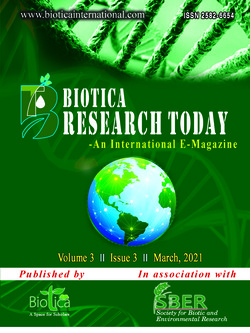
Use of Marker Assisted Selection (MAS) in Crop Improvement
Tarkeshwar*
Dept. of Genetics and Plant Breeding, Acharya Narendra Deva University of Agriculture and Technology, Kumarganj, Ayodhya, Uttar Pradesh (224 229), India
Ravi Prakash Chaudhary
Dept. of Genetics and Plant Breeding, Acharya Narendra Deva University of Agriculture and Technology, Kumarganj, Ayodhya, Uttar Pradesh (224 229), India
Soni Singh
Dept. of Genetics and Plant Breeding, Acharya Narendra Deva University of Agriculture and Technology, Kumarganj, Ayodhya, Uttar Pradesh (224 229), India
Govind Mishra
Dept. of Genetics and Plant Breeding, Acharya Narendra Deva University of Agriculture and Technology, Kumarganj, Ayodhya, Uttar Pradesh (224 229), India
Shiva Nath
Dept. of Genetics and Plant Breeding, Acharya Narendra Deva University of Agriculture and Technology, Kumarganj, Ayodhya, Uttar Pradesh (224 229), India
DOI: NIL
Keywords: Gene pyramiding, Marker assisted backcrossing, Marker assisted selection, Molecular markers
Abstract
Pyramiding multiple genes with potential characteristics into a single genotype through marker-assisted selection (MAS) can improve the efficiency of generating new crop varieties exhibiting disease resistance, as well as other desirable traits. Although markers can be used at any stage during a typical plant breeding programme, MAS is a great advantage in early generations because plants with undesirable gene combinations can be eliminated. Conventional breeding has got tremendous success towards feeding the world. But future demands, continuous development of new crop varieties to suitable to fight diverse problems in less time future. To address this problem MAS can be supplementary to conventional breeding programme.
Downloads
not found
Reference
Hsu, Y.C., Chiu, C.H., Yap, R., Tseng, Y.C., Wu, Y.P., 2020. Pyramiding Bacterial Blight Resistance Genes in Tainung82 for Broad-Spectrum Resistance Using Marker-Assisted Selection. Int. J. Mol. Sci. 21, 1281. doi:10.3390/ijms21041281.
Pratap, A., Chaturvedi, S.K., Tomar, R., Rajan, N., Malviya, N., Thudi, M., Saabale, P.R., Prajapati, U., Varshney, R.K., Singh, N.P., 2017. Marker‑assisted introgression of resistance to fusarium wilt race 2 in Pusa 256, an elite cultivar of desi chickpea. Mol. Genet. Genomics DOI 10.1007/s00438-017-1343-z.
Tao, C., Hao, W., Ya-dong, Z., Zhen, Z., Qi-yong, Z., Li-hui, Z., Shu, Y., Ling, Z., Xin, Y., Chun-fang, Z., Cai-lin, W., 2016. Genetic Improvement of Japonica Rice Variety Wuyujing 3 for Stripe Disease Resistance and Eating Quality by Pyramiding Stv-bi and Wx-mq. Rice Science 23(2), 69-77. http://dx.doi.org/10.1016/j.rsci.2016.02.002.
